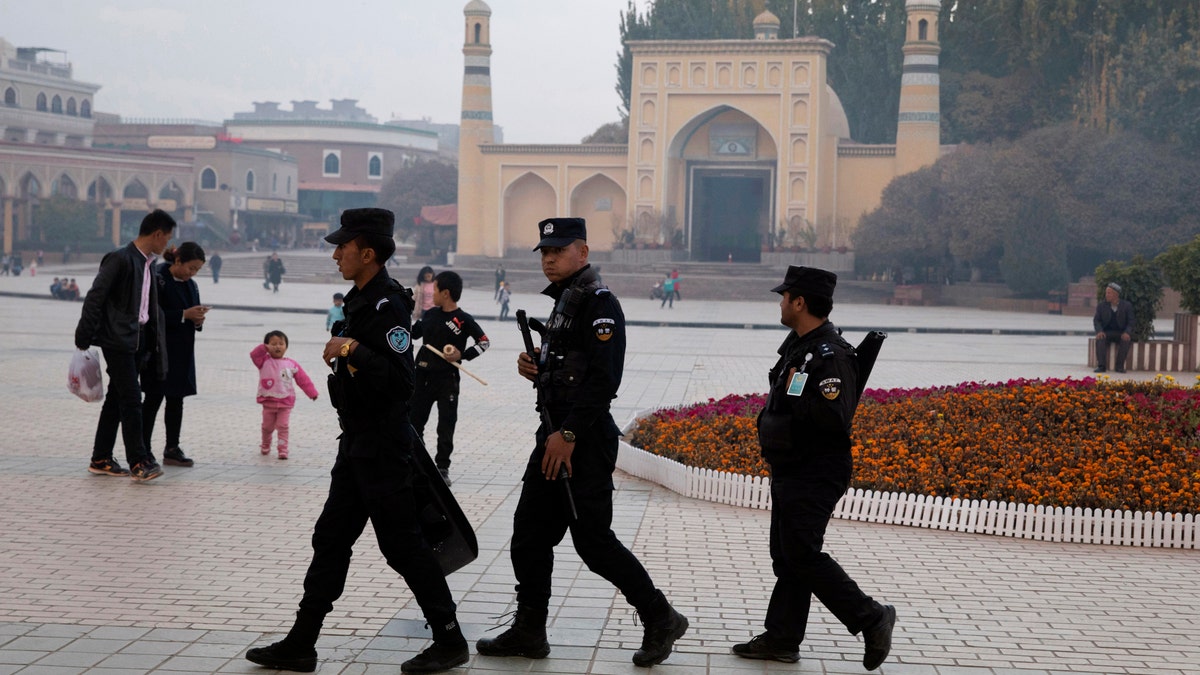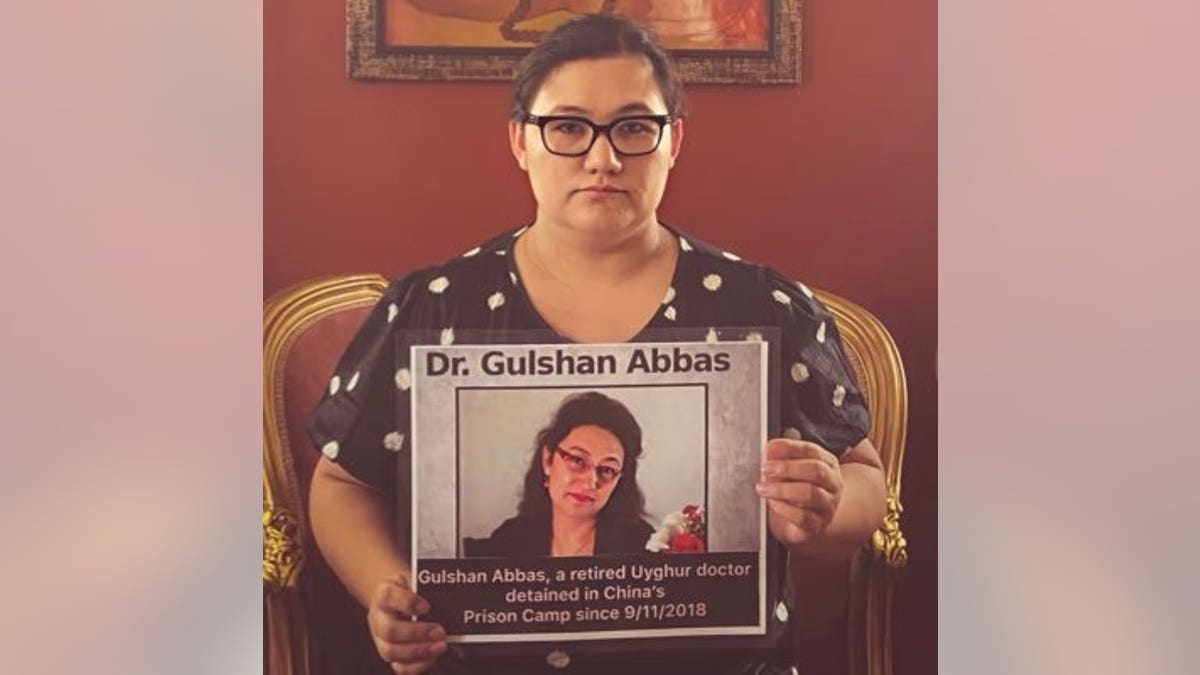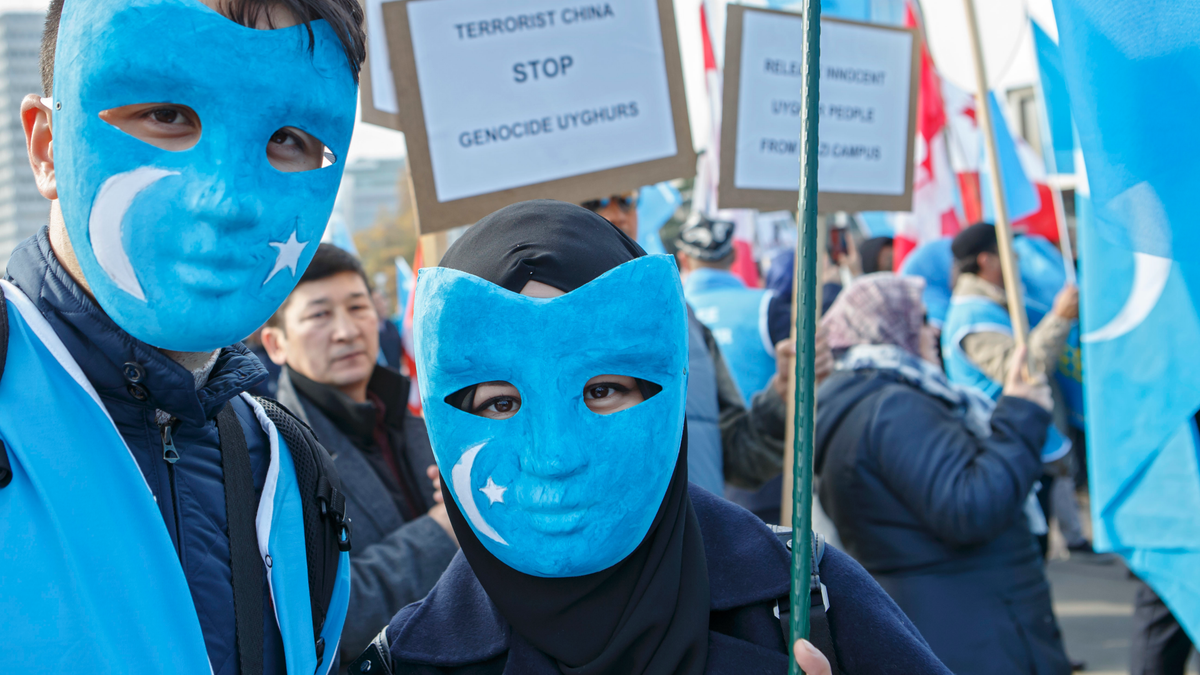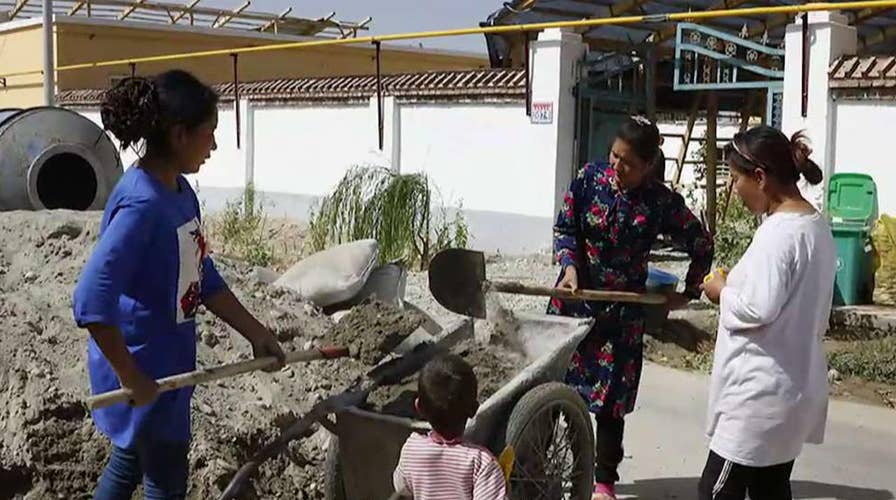Chinese treatment of Uighur Muslims draws comparisons to concentration camps
Human Rights Watch says the Chinese government is holding up to a million in 'political education' camps in the northwestern region of Xinjiang; State Department correspondent Rich Edson reports.
For people like Sainawar Rouzi, life in exile is one punctured by the pains of the unknown.
"My family never did anything wrong. They never did anything illegal or committed a crime. Now they have disappeared or live in fear – waiting for a knock at the door," Rouzi, an Uighur immigrant based in the U.S., said of her relatives trapped in Xinjiang province of China. "We all live in prisons in our mind, wondering how this has happened to our people. I have to be the voice for my family, for the Uighurs. They have no voice."
Many others like Rouzi, a soft-spoken nurse in Ohio, have been risking their safety for years to shed light on the atrocities their minority is enduring some 6,500 miles away: from involuntary abortions and possible organ harvesting to human rights abuses, forced disappearances and being confined to concentration camps. Yet hopes of action on a global scale were further dimmed last week.
The International Criminal Court (ICC) rejected to open an investigation into the mounting allegations of genocide against the Uighur Muslims in China, meaning the Chinese Communist Party (CCP) has a free rein to continue what it deems "re-education" camps – for now.
CHINA USES MUSLIM UIGHUR FORCED LABOR TO MASS PRODUCE CORONAVIRUS PPE EXPORTED GLOBALLY: REPORT
Beijing, like the United States, is not a signatory to the Rome Statute, which founded the ICC in 2002. The court was intended to be the world's first permanent international criminal legal structure to endorse the rule of law, ensure human rights protection, and punish the most abhorrent international crimes.

In this Nov. 4, 2017 file photo, Uighur security personnel patrol near the Id Kah Mosque in Kashgar in western China's Xinjiang region. Classified documents, leaked to a consortium of news organizations, lay out the Chinese government's deliberate strategy to lock up ethnic minorities to rewire their thoughts and even the language they speak. (AP Photo/File)
Yet activists had carefully been compiling evidence about acts of genocide, including classified Chinese government cables detailing a sweeping surveillance system and extrajudicial detention – much to Beijing's chagrin.
"China has tried to avoid the ICC at all costs. Recently, on November 18, 2020, the Chinese government held a press conference in Urumchi and pushed back against the Uyghurs' complaint to the ICC," Salih Hudayar, prime minister of the East Turkistan Government in Exile, which filed the investigation request, told Fox News.
The case put forth was based on operations against the Uighurs residing in Tajikistan and Cambodia, both of which are ICC members. Furthermore, a collective of more than 60 parliamentarians from more than a dozen countries also added their gravitas to the appeal, sending a letter to prosecutor Fatou Bensouda requesting that the international legal body "play its part in ensuring that the perpetrators of the most egregious human rights abuses are held accountable and prevented from acting with impunity."
However, the office of ICC prosecutor Bensouda stated last week the "precondition for the exercise of the court's territorial jurisdiction did not appear to be met with respect to the majority of the crimes alleged" since they appear "to have been committed solely by nationals of China within the territory of China, a State which is not a party to the Statute."
But for some analysts, the argument doesn't hold weight – raising questions over a broader influence of China in the international community and throughout the United Nations, of which The Hague, Netherlands, is affiliated with but functions independently.
"It is truly amazing and revealing that the Chief Prosecutor so quickly determined that the ICC lacked jurisdiction to investigate the alleged genocide being perpetrated against the Uighurs by the Chinese government," said Nitsana Darshan-Leitner, an Israel-based attorney who has long specialized in suing terrorist regimes and state sponsors who orchestrate human rights abuses on behalf of victims. "Fatou Bensouda's announcement that since China is not a state member, she is powerless to proceed against Beijing must be contrasted with her ruthless pursuit of war crime allegations against Israel and the United States. Like China, neither Israel nor the U.S is a signatory to the Rome Treaty."
HOW US CAN HELP CHINA'S UIGHURS, WHO SUFFER DISAPPEARANCES, FORCED ABORTIONS, OTHER ATROCITIES
While information filtering out of the rugged, autonomous province remains opaque, broad investigations have revealed that since at least 2017, upwards of 2 million of the minority group have been propelled into detainment camps, which the CCP initially denied but later referred to them as "re-education" facilities, as part of an extensive anti-terrorism campaign.
Yet few Muslim-majority nations, fearing retaliation from Beijing, which has a broad global influence in terms of its loans and reconstruction endeavors, have dared speak out. Instead, the U.S. has remained at the forefront and unwaveringly vocal in its condemnation and issuing of sanctions, as well as trade restrictions on goods from the region over concerns of forced labor.

Ziba, a Uighur, appeals for her mother's return. (Ziba Murat)
Several similarly outraged Western countries have subsequently echoed the denouncement. Finally, at the U.N. in October, 39 member states – including the European Union and Japan – joined Washington in reprimanding Beijing over the proliferating list of human rights misconduct.
Yet as many experts contend, confronting China could come with economic and political repercussions.
According to Darshan-Leitner, if the ICC did decide to investigate further and indict China, the CCP would likely utilize "all its political and economic might to derail the investigation."
"China would correctly argue it did not sign the Rome Treaty and the ICC lacks jurisdiction. Moreover, China would flex its muscles and demand all member countries that want to continue doing business with China to place pressure on the chief prosecutor to terminate the investigation," she surmised. "China is an international powerhouse economically, politically and militarily. The ICC is well aware of the pain and havoc Beijing could impose on the court and its officials, including the justices and prosecutors."
Although not party to the ICC, analysts have questioned China's underhanded influence on the court system, as a permanent member of the U.N. Security Council and controversial election to the Human Rights Council in October.
In 2000, Beijing's fiscal commitments to the U.N.'s regular budget stood at just $12 million – making up only 1% of total donor contributions. But fast forward two decades, and that amount now stands at around $367.9 million – some 12% of the total – propelling China to the rank of No. 2 donor, behind the U.S. As of Dec. 15, 2020, according to U.N. data, 139 member states have paid their regular budget assessments in full – which includes Beijing, which paid its bill in May, subsequent to the end of the 30-day due period and amid the growing firestorm emanating from the coronavirus fallout, which is believed to have started last year in the Chinese province of Wuhan.

Uyghurs people demonstrate against China during the Universal Periodic Review of China by the Human Rights Council, on the place des Nations in front of the European headquarters of the United Nations, in Geneva, Switzerland, Tuesday, Nov. 6, 2018. (Salvatore Di Nolfi/Keystone via AP)
However, last year, the ICC green-lit a probe into crimes against Rohingya Muslims in Burma, also called Myanmar, and Bangladesh. Myanmar is not a member of the ICC either. Still, the court determined that it had the authority to investigate the alleged crimes in Bangladesh, which ratified the Rome Statute a decade ago.
Canadian human rights lawyer David Matas also pointed out that in 2019, there was a complaint against China for crimes against the Philippines. Still, the prosecutor concluded that the crimes did not fall within the jurisdiction of the Court.
"This is a general problem with the international legal system. In principle, the rule of law means that no one is above the law. Yet, for the international instances which address international law, that is not the case," he conjectured. "China objectively is big, relatively well to do and powerful. The weight it objectively has is magnified in the international arena because of solidarity among non-democratic regimes as well as gratitude for the money China pours on developing countries with the expectation of political support in exchange."
And in 2015, the ICC opened an exploratory review into the 2014 Gaza conflict after the Palestinian Authority sent a complaint about war crimes committed by the Israeli military. Matas subsequently underscored that "the international legal system suffers from a double standard," and that the contrast with Israel, "a small country, unpopular in the international arena, is striking."
"Look at the issue only of transfer, addressed for both countries in 2020. For China, as noted, the prosecutor concluded that there was an insufficient basis on which to proceed. The conclusion for Israel was the opposite that, on transfer, there were reasonable grounds to believe that the crime had occurred," he argued. "Yet for Israel, the Prosecutor was addressing the voluntary movement of Israel citizens into the West Bank. For China, the Prosecutor was addressing forcible transfer to death, torture, or cruel and inhumane treatment."
CLICK HERE TO GET THE FOX NEWS APP
Nonetheless, the ICC's Uighur case file remains open – and the Office of the Prosecutor (OTP) has confirmed that it has received a request for "reconsideration" pursuant to further facts and evidence.

View of the International Criminal Court, or ICC, where Congolese militia commander Bosco Ntaganda is scheduled to hear the sentence in his trial in The Hague, Netherlands, Thursday, Nov. 7, 2019. The ICC is delivering the sentence on Ntaganda, accused of overseeing the slaughter of civilians by his soldiers in the Democratic Republic of Congo in 2002 and 2003. (AP Photo/Peter Dejong)
But what that amounts to remains to be seen.
"The next step in the case is to provide the prosecutor with further evidence, regarding the deportation of Uighurs from Tajikistan and Cambodia back to China, that she has highlighted is needed to open an investigation," added Rodney Dixon, an international human rights lawyer and the lead counsel on the case. "We have been gathering this evidence since the case was submitted in July and will be presenting that evidence to the office of the prosecutor in the new year."


